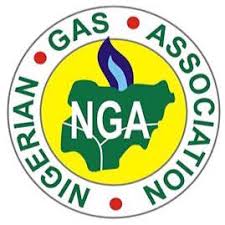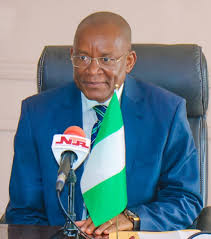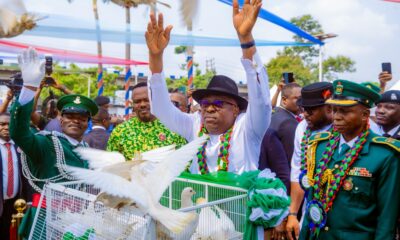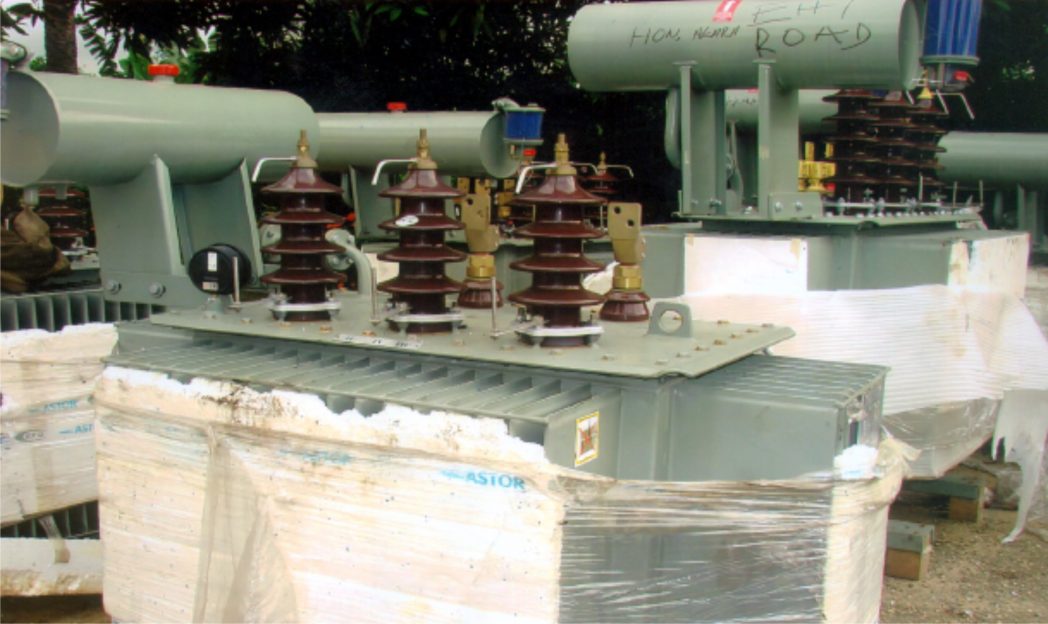Oil & Energy
Oil Price Fall And Nigeria’s Economy
At the 7th All Nigeria
Guild of Editors conference held in Benin, the Edo State capital on Thursday, September 22, 2011, the former minister of the Federal Capital Territory, Mallam Nasir el-Rufai, raised alarm that should oil price drop below $80 per barrel in the international market, some state governments in Nigeria would not be able to pay salaries to their workers.
El-Rufai, who was speaking on the topic, “Perspectives on the Cost of Governance in Nigeria”, had strongly noted that pegging of oil price as high as $75 then in the national budget was unrealistic and not good for Nigeria’s economy.
The minister was being as prophetic as many individuals and organizations who believed that the nation’s economy which is oil dominated would be in a quagmire, should any unforeseen surprises affect the oil price in the global market.
Various experts had also, for too long been consistent in expressing strong need for drastic reduction in the high cost of Nigerian governance which gulps as high as 25% of the annual budget and one of the highest in the world.
They had equally suggested diversification of the economy from oil to other sectors particularly agriculture which hold high promises for food on the table of the average Nigerian, mass employment, raw material for industrialization and foreign exchange earning.
While most nations of the world had strategized to contain such possible economic fears, most African governments also took bold steps in preparations for the economic uncertainties, but some deaf-and-dumb governments had preferred what goes directly into the individual pockets of the leaders than the general good of the citizens. Billions of Dollars meant for constituency funds, furniture extravagant travelling allowances, amongst others find their ways to the law makers and their crowd of primal aides.
Today, the reality is not only knocking at our doors but is quite here with us. The present systematic drop in the oil price which experts predict could slide far below $50 per barrel benchmark before the end of 2015 has become Nigeria’s undoing.
Many state governments in Nigeria today are owing months of salaries arrears to their workers while contractors have abandoned projects execution because the oil price then predicted had fallen below budgetary calculations and states lack the funds to pay.
Some private schools in Port Harcourt have already given notice of increase in school fees, landlords are also threatening to raise rent, labour unions are ironically agitating for pay rise in view of recent devaluation of Naira occasioned by dramatic drop of oil price in global market even as state governments insist they would not review the $65 per barrel benchmark on which they proposed their 2015 budgets. Where would these excoriations take the nation to in the present economic situation determined by global economic reality?
An economist, George Clement, is of the view that time has come for Nigeria to elect leaders who have the capacity to proffer solutions to the socio-economic challenges confronting the nation as against empty promises for which most Nigerian political leaders are known.
“The era of touts aspiring for public offices should be over. It is time to look beyond sweet talks and empty promises now that campaign period in Nigeria is around the corner”, said Clement.
He said, “our leaders had since the oil boom of the 70s refused to do the right thing. Billions of Naira had consistently been swallowed up by the pockets of fraudulent leaders”, he remarked noting that the future generations may have nothing to be proud of about their nation if the real change is not effected.
Another respondent, Mrs Mary Jonathan, in her own reaction is challenging the Economic and Financial Crimes Commission (EFCC) to trace the loots of the nation wherever they might have been hidden.
“Yes, it appears late but not too late. We cannot continue to wallow in poverty in a rich country while few persons in the name of politics continue to cart away our resources”, she stressed.
Jonathan appealed to the Federal Government to review the pump price downward to reflect the price of oil in the global market. “We cannot afford to pay more when actually the price has fallen. The N97 per litre of fuel is no longer realistic”, she maintained.
A civil servant, Makel Ndah, in his own reaction called for upward review of workers salary. “Since the Naira has been devalued, its exchange power has become weak, it is important that the government reviews workers salary upward to meet with the current market reality”.
A landlord in Port Harcourt Chief Clifford Nweke, said,” it is obvious that house rent would be reviewed since government has started to have a second look at the Naira.”
We are all Nigeirans, operating in the same market, so what affects one should equally affect the other. Yes some people will say landlords are wicked shylocks, but that is mere sentiment”, he maintained.
A private school proprietor who pleaded anonymity said, “we had our first Parent Teachers Meeting last week and the issue of increase of salaries was raised by the teachers and I told the parents to pray and watch because for me to pay higher workers salary means that the fees charged students would also be reviewed upward.
“Please don’t get me wrong, we have not increased school fees yet. What I am saying is that we in my school are studying the socio-economic variables. If workers salary goes up and other schools readjust to meet with the reality, we here would also adjust because we are part of the society”, he explained.
A Port Harcourt- based public analyst, Christian Nnamdi, said the issue calls for caution. “There is no need to panic yet. It is not a Nigerian thing but a global phenomenon. It does not affect only Nigeria but other nations of the world. Nigeria has many antidotes to the problem. So all we need to do is study the situation to know the dynamic nature of the change.
According to Nnamdi, the nation should not leave everything in the hands of politicians. “We need to protect the economy from the excesses of selfish Nigerian politicians and one way of doing that is to gather together some technocrats and experts in various fields especially economists. Let the think- tank develop an economic plan that should guide the policies and programmes.
Call it 25 years economic development plan. So that whichever political group that takes the mantle of leadership, will have to build whatever programme from the economic blue print.
Nnamdi blamed the woe of the nation on inconsistency of leadership, stressing that government should be seen as a continuation from where the former ends. “But you see, in Nigeria, any new administration is in the habit of abandoning the programmes of the previous administration at the detriment of so much fund sunk into such projects because they want to take credit.
“But with a long term economic development plan, new government can no longer abandon projects started by the former government. It has to inherit it and complete it for the people. This idea will make nonsense of the penchant for second term which is common in Nigeria,” he maintained.
It would be recalled that discovery of shale oil which increase supply in American oil market, a major importer of Nigeria’s oil has affected the oil supply in the global market. This high supply has reduced oil price in the global market and Nigeria, whose economy remains oil-driven is directly affected.
Nigeria whose budget depends on oil has been forced to review its oil benchmark resulting in austerity measures to contain the economic downturn.
Medium Term Expenditure framework which the Finance Minister, Dr. Ngozi Okonjo-Iweala, submitted to the National Assembly, scaled down the nation’s budgetary estimate for 2015 to N4.661 trillion as against an initial N4.817 trillion.
Chris Oluoh
Oil & Energy
Bill Prohibiting Gas Flaring Passes 2nd Reading

The Bill for an act to prohibit gas flaring, encourage commodity utilisation, and provide for penalties and remedies for gas flaring violations has passed its second reading in the House of Representatives.
Sponsored by the Member representing Ikorodu Federal Constituency (APC, Lagos), Babajimi Adegoke Benson, the bill seeks to prohibit the flaring and venting of natural gas, except in strictly regulated circumstances, while encouraging the utilisation of gas resources to foster economic growth and energy generation.
The proposed legislation aims to mitigate the environmental, health, and economic impacts of gas flaring, aligning Nigeria’s oil and gas operations with international climate change commitments.
Offenders, who violate the provisions of the proposed law, would face stringent penalties, including fines of $5 per 1,000 standard cubic feet of gas flared and potential suspension of operations for repeat violations.
Leading debate on the general principles of the bill, Benson said gas flaring has plagued Nigeria for decades, resulting to severe environmental degradation, public health crises, and economic losses while it environmentally, contributes to greenhouse gas emissions, global warming, and acid rain, exacerbating climate challenges.
The lawmaker said public health impacts of the practice are equally dire, as pollutants from gas flaring cause respiratory and cardiovascular diseases, particularly among residents of communities close to flaring sites.
According to him, economically, flaring results in the waste of a valuable resource that could otherwise be harnessed for energy generation or exported to generate revenue.
Benson insisted that the bill was designed to address those issues while bringing Nigeria in line with global standards such as the Paris Agreement on climate change.
“The bill provides for a comprehensive prohibition of gas flaring except in emergencies or when explicitly authorised by the Nigerian Upstream Petroleum Regulatory Commission (NUPRC).
“Operators are required to submit and implement Gas Utilisation Plans, detailing how gas that would otherwise be flared will be captured, processed, or commercialised.
“Offenders, who violate these provisions, face stringent penalties, including fines of $5 per 1,000 standard cubic feet of gas flared and potential suspension of operations for repeat violations. Furthermore, the Bill ensures that communities affected by gas flaring are entitled to compensation and environmental restoration, creating a mechanism for redress.
“Transparency and accountability are integral to the enforcement framework of this Bill. Operators must submit regular reports on gas flaring incidents, which will be audited and made publicly available by the NUPRC. This approach ensures public oversight and stakeholder engagement, fostering trust and compliance.
“Nigeria’s adoption of this Bill positions the country to emulate such success, ensuring a balance between environmental stewardship and economic development.
“The implementation of this Bill will be overseen by the Nigerian Upstream Petroleum Regulatory Commission, which will monitor compliance through regular audits, enforce penalties, and facilitate gas utilisation projects in collaboration with operators and development partners.
“The Anti-Gas Flaring (Prohibition and Enforcement) Bill, 2024, is a timely and necessary response to one of Nigeria’s most pressing environmental challenges. Its provisions are both practical and forward-looking, addressing immediate concerns while laying the groundwork for a sustainable future.
“I urge all Honourable Members to support the Second Reading of this Bill as a demonstration of our collective commitment to environmental protection, public health and economic progress”, he added.
###
Oil & Energy
‘Indigenous Companies To Gain From Shell’s Contract Awards’

Oil major, Shell, has restated its commitment to the development of Nigerian companies through contract awards and scaling up of expertise.
Managing Director, Shell Nigeria Exploration and Production Company ((SNEPCO) Limited, Ron Adams, made the remark while speaking at the Opening Ceremony of the 13th edition of the Practical Nigerian Content forum held in Yenagoa, Bayelsa State, with the theme “Deepening the Next Frontier for Nigerian Content Implementation”.
Represented by the Manager, Business Opportunity, SNEPCO’s Bonga South-West Aparo Project, Olaposi Fadahunsi, he said several benefitting companies had taken advantage of the patronage to expand their operations and improve their expertise and financial strength.
Adams said, “Shell companies execute a large proportion of their activities through contracts with third parties, and Nigeria-registered companies have been key beneficiaries of this policy aimed at powering Nigeria’s progress”.
He emphasized that Shell companies in Nigeria also continued to develop indigenous manpower through scholarship programmes with over 3,772 undergraduate and 109 Niger Delta post graduate scholarships since 2016.
“As we speak, beneficiaries of the 13th edition of the Niger Delta Post Graduate Scholarship awards are pursuing their studies in the United Kingdom. The employability rate of the scheme is high with over 98% of the graduates who won the awards securing employment in the oil and gas industry, academia and Information Technology, among other sectors, within one year of completing their studies”.
He commended the Nigeria Content Development and Monitoring Board (NCDMB) for ensuring compliance with the Nigerian Content Act saying “Nigerian content will continue to be an important part of Shell operations”.
The four-day conference hosted by the Nigerian Content Development and Monitoring Board (NCDMB) and participating companies reviewed progress on the development of Nigerian content pertaining to the implementation of the Nigerian Oil and Gas Industry Development (NOGICD) Act since it was enacted in 2010.
Shell companies in Nigeria are among the more than 700 oil and gas entities that participated in the forum with a strong message of support for Nigerian companies, having awarded contracts worth $1.98 billion to the businesses in 2023 in continuing effort to develop Nigerian content in the oil and gas industry.
Oil & Energy
NNPC Begins Export From PH Refinery

The Nigerian National Petroleum Company Limited (NNPCL) has sold the first cargo of Port-Harcourt low sulfur straight run fuel oil (LSSR) to Dubai-based Gulf Transport & Trading Limited (GTT).
The company is expected to load the cargo in the coming days onboard the Wonder Star MR1 ship, signalling the commencement of operations at the plant and the exportation of petroleum products.
The ship would load 15,000 metric tons of the product, which translates to about 13.6 million litres.
Although the volume coming from the NNPC into the global market is still small, the development has the potential to impact the Very Low Sulphur Fuel Oil (VLSFO) benchmarks in the future, while changing the market realities for Atlantic Basin exporters into Nigeria and other regions.
The sulfur content of the export by NNPC stands at 0.26 per cent per wt and a 0.918 g/ml density at 15°C, according to Kpler, a data and analysis company.
The cargo was reportedly sold at an $8.50/t discount to the NWE 0.5 per cent benchmark on a Free on Board (FOB) basis.
Kpler reported that the development would help displace imports from traditional suppliers in Africa and Europe, as Nigeria’s falling clean product (CPP) imports are already decreasing, dragging imports into the wider West Africa region lower as well.
-

 Business3 days ago
Business3 days agoNGA Becomes Official Partner To 29th Gas Conference … As President Set To Address 2025 World Summit
-

 News3 days ago
News3 days agoMilitary kills 156 terrorists, nabs 146 suspects in one week – DHQ
-

 News3 days ago
News3 days agoRotary Foundation commits $300m to polio eradication in Nigeria
-
Rivers3 days ago
Kelga Boss Tasks Residents On Peace … As Elele Community Holds Thanksgiving
-

 Business3 days ago
Business3 days agoMinister Inspects Nigeria/Benin Republic-owned Sugar Firm … Decries Decrepit Condition
-

 Featured3 days ago
Featured3 days agoUAE president to visit Nigeria in 2025
-

 Featured3 days ago
Featured3 days agoWe’re Vigilant, Steadfast In Preserving Peace, Stability Of Rivers – Fubara …Lays Wreath To Mark 2025 Armed Forces Remembrance Day
-
Rivers3 days ago
Fubara Approves N50m For Widows Of Fallen Service Personnel


